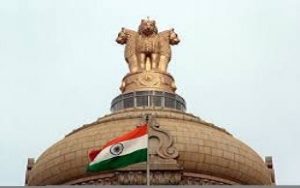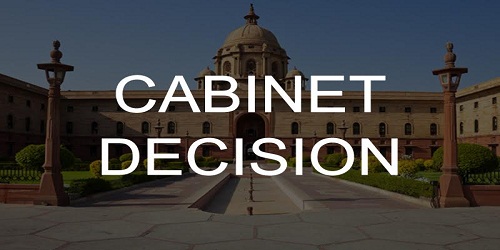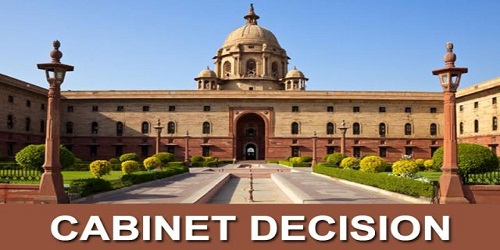On July 26, 2017, Union Cabinet chaired by Prime Minister Narendra Modi approved following bilateral agreements and initiatives:
Cabinet gives ex-post facto approval for amendment of the Constitution (Application to Jammu & Kashmir) Order, 1954
Union Cabinet, has given its ex-post facto approval for amendment of the Constitution (Application to Jammu & Kashmir) Order, 1954 by way of the Constitution (Application to Jammu & Kashmir) Amendment Order, 2017.
- The approval paves the way for applicability of Goods and Services Tax regime in the State of Jammu & Kashmir.
- The Constitution (Application to Jammu & Kashmir) Amendment Order, 2017 has already been notified in Gazette of India on July 6, 2017 after the assent of the President.
Cabinet apprised of the MoU signed between India and Palestine on cooperation in the field of youth affairs and sports
Union Cabinet has been apprised of the Memorandum of Understanding (MoU) signed between India and Palestine on cooperation in the field of youth affairs and sports.
- The MoU will help in promoting exchange of ideas, values and culture amongst all youth irrespective of their caste, religion and gender as well as development of sports in India and Palestine. It will thereby help in consolidating friendly relations between the two countries.
Cabinet apprised of the Joint Declaration of Intent between India and Germany on Indo German-Centre for Sustainability
The Union Cabinet has been apprised of the Joint Declaration of Intent (JDI) between Department of Science & Technology (DST), India and the Federal Ministry of Education and Research (BMBF), Germany on Indo German-Centre for Sustainability (IGCS). The JDI was concluded on May 30, 2017 in Germany during the fourth Inter-Governmental Consultations (IGC).
More Information about Joint Declaration of Intent between India and Germany on Indo German-Centre for Sustainability:
- The objective of the JDI on IGCS is to promote cooperation between German and Indian scientists on fundamental and applied scientific research.
- It includes areas such as policy support, teaching, training and dissemination of information in the area of sustainable development and climate change through inter-disciplinary/trans-disciplinary research.

- The IGCS will nurture future collaboration by widening the network with other Universities, Institutes and industries both in India and Germany.
- On the Indian side, Indian Institute of Technology (IIT), Madras will act as the host institution for IGCS.
- DST and BMBF will jointly support the IGCS for a period of five years starting from January 2018.
Cabinet approves revision of cost of Socio Economic and Caste Census 2011
Cabinet Committee on Economic Affairs has approved the proposal of Department of Rural Development for revision of cost of Socio Economic and Caste Census 2011 (SECC 2011) which provides for:
- Revising the cost of SECC 2011 to 4893.60 crore from the approved estimated expenditure of Rs.3543.29 crore.
- Approval of time and cost overrun and consequential revision in the upper limit of cost per record to the consortium of Central Public Sector Undertakings.
Utility of SECC – 2011:
- Before the availability of SECC -21011 data, Below Poverty Line (BPL) list prepared in 2002, by States/UTs was being used for identifying beneficiaries of development programmes and schemes including Pradhan Mantri Awaas Yojana-Gramin (PMAY-G) and National Social Assistance Programme (NSAP).
- The 2002 BPL list attracted claims of biases. It was decided by the Government on 19.05.2011 to launch a Socio Economic and Caste Census 2011 in order to get data for ranking of households for receiving benefits from the Government.
- To avoid exclusion and inclusion errors, the SECC 2011 elicited information on identified parameters from each household for identification of deprivation and multi-dimensionality of poverty.
Cabinet clears minimum wage code bill
On July 26, 2017, Union Cabinet cleared a new Minimum Wage Code Bill that will integrate four different wage legislations.
More Information about Minimum Wage Code Bill:
- Through the Minimum Wage Code Bill, labour ministry plans to streamline the definition of wages by amalgamating four wage-related statutes including the Minimum Wages Act, 1948, the Payment of Wages Act, 1936, the Payment of Bonus Act, 1965, and the Equal Remuneration Act, 1976.
- The bill also seeks to empower the Centre to set a minimum wage across sectors, and states will have to maintain that.
- At present, laws on wages do not cover workers getting monthly wage of more than Rs 18,000. Once Parliament approves this Bill, the minimum wage will be applicable on all classes of workers.





